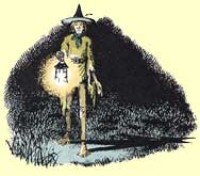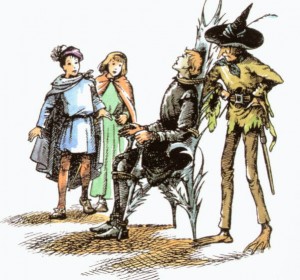There comes a point in the story of The Silver Chair (C.S. Lewis) in which the adventurers are almost overcome by an enchantment cast by the Queen of Underland. To the smell of a sweet green powder burning on the fire and the soft intonations of a mandolin the Queen repeats a lie,
“There is no Narnia, no Overland, no sky, no sun, no Aslan.”
Then, while the Prince and children slumber, the aptly named Puddleglum speaks to the witch onher own terms: let us assume that you are correct; let us assume the worst.
“I’m a chap who always liked to know the worst and then put the best face I can on it. So I won’t deny any of what you said. But there’s one more thing to be said, even so. Suppose we have only dreamed, or made up, all those things – trees and grass and sun and moon and stars and Aslan himself. Suppose we have. Then all I can say is that, in that case, the made-up things seem a good deal more important than the real ones. Suppose this black pit of a kingdom of yours is the only world. Well, it strikes me as a pretty poor one. And that’s a funny thing, when you come to think of it. We’re just babies making up a game, if you’re right. But four babies playing a game can make a play-world which licks your real world hollow.”
He continues:
“That’s why I’m going to stand by the play world. I’m on Aslan’s side even if there isn’t any Aslan to lead it.”
 Puddleglum’s argument doesn’t satisfy everyone, of course; but I don’t think it to be one in which he has reluctantly accepted the non-existence of God. (C. S. Lewis certainly didn’t.) It would be decidedly odd, not to say disconcerting, if he had declared his loyalty to a world and to ideas which he had already dismissed as untrue. Rather, it seems, he grants some truth to the Queen’s lie as a means of defeating it – if her black pit of a world is all there is, then it is a “funny thing” that the made up story should not only keep on finding traction, but prove to be better than her reality.
Puddleglum’s argument doesn’t satisfy everyone, of course; but I don’t think it to be one in which he has reluctantly accepted the non-existence of God. (C. S. Lewis certainly didn’t.) It would be decidedly odd, not to say disconcerting, if he had declared his loyalty to a world and to ideas which he had already dismissed as untrue. Rather, it seems, he grants some truth to the Queen’s lie as a means of defeating it – if her black pit of a world is all there is, then it is a “funny thing” that the made up story should not only keep on finding traction, but prove to be better than her reality.
More pertinently, it is an odd thing that there is a story at all, in a world as hollow as her’s. Let us grant your lie, he says, then tell me, from whence have the stories come? And at that, the witch gave up on her enchantment and conceded defeat; for although she was deceitful, she was also realistic and she knew that her bluff had been called. And Puddleglum led them back to the light.
But let us imagine, for a moment, that Puddleglum had accepted that that the “black pit of a kingdom” really was the only world he had. Imagine, for example, that he had become convinced that there was, “no Narnia, no Overland, no sky, no sun, no Aslan.”
Let us imagine that he had accepted the death of the Narnia, the death of Aslan and his own death in the Underland; and that in this he was at one with the Queen.
And let us imagine then, that knowing all this and acknowledging all this, he continued, for some reason, to borrow the language of that which did not exist and which was not true.
Let us imagine that he said something like this:
“I have learned to accept my own death and that there is no greater meaning beyond it, behind it, or over it.” And then, at the very same time, said something like this: “Now I am free to find meaning; I am free to bring light to this dark place, free to hope and to live”.
Let us imagine that he said something like this:
“while the universe is definitely not rigged in your favour, and really does not care one bit about you, there is still hope.”
Or something like this:
“Our lives, our wonderful consciousness, are a brief flowering of something terribly beautiful. But it is a beauty that has no greater meaning than itself. It does not point to a higher beauty above, nor to a perfect coherence in the universe that we don’t yet understand.”
And what, then, if this was argued, stated and justified by Puddleglum explicitly in the language of Aslan?
“The problem of God we unearth in this radical reading of Christianity is that ‘he’ keeps on being resurrected.”
“We keep on pushing beyond Good Friday to Easter Sunday, but the point of Christianity is the crucifixion of all gods, the continual putting to death of these narratives that desire immortality – but lead us into terrible anxiety.”
A softer, (or perhaps more enchanting) and more (a)religious tone can be found here:
“…let us not think that Sunday is a Monopoly card that gets us out of some cell. If anything, Good Friday is the “Get out of Jail free” card. It is that which helps us escape the prison-house of meaning.”
The idea is nuanced a little more here, and also interesting for it’s criticism of “the Enlightened New Atheist”, while inhabiting exactly the same world. But read the whole article carefully. I would highlight this phrase:
“The response is not for the besotted grandparent to say, “my child is average looking,” – the equivalent of a non-committal agnosticism – but to fully affirm the claim that her grandchild is the most beautiful child in the world without needing some ground for the claim.”
Puddleglum would never have said this.
 Now all of this, I know, is a lot to process; but we should know that it is being said. These are words without meaning, from a meaningless world which doesn’t exist – from a non-existent world in which meaning has died (if it ever existed), but it is claimed that they bring us meaning in a world which has none.
Now all of this, I know, is a lot to process; but we should know that it is being said. These are words without meaning, from a meaningless world which doesn’t exist – from a non-existent world in which meaning has died (if it ever existed), but it is claimed that they bring us meaning in a world which has none.
And they are brought in the name of Jesus.
The phenomenon is Christian Atheism; it is Pyrotheology; it is religionless Christianity; and it claims the words of the Overland, while it strums the Queen’s mandolin.

